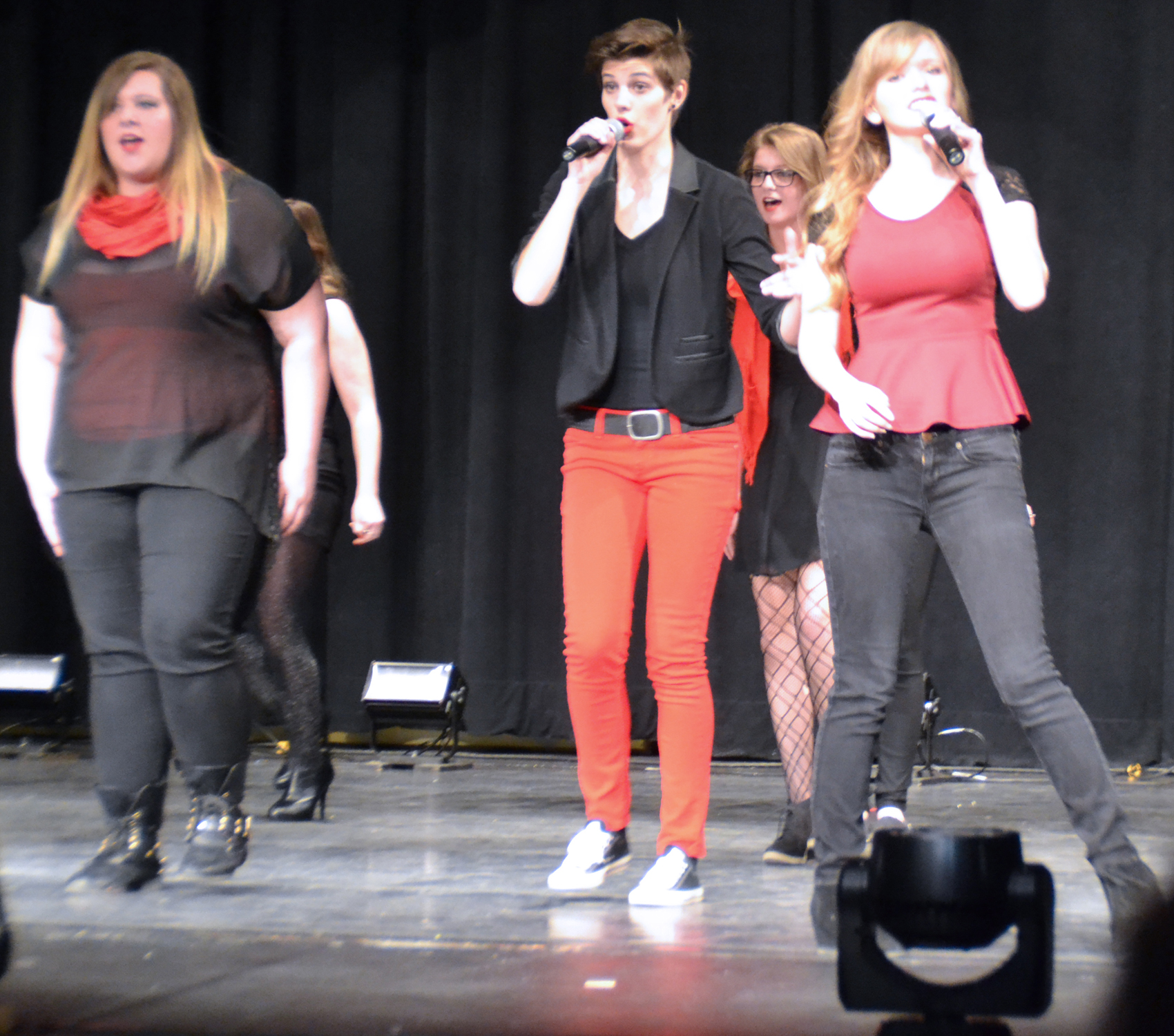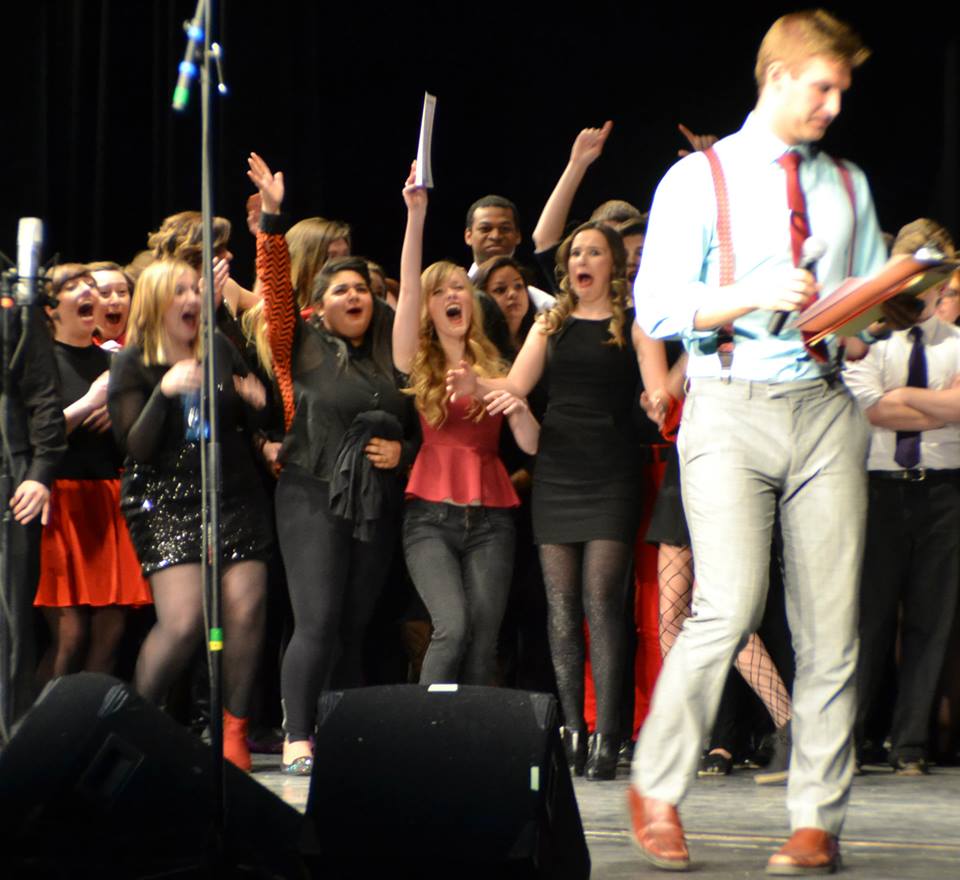One of the microphone starts to fail as soon as they begin their performance. But that doesn’t stop them.
They are Pitch Black, OWU’s all-women a cappella group and this is one of the International Championship of Collegiate A Cappella (ICCA)’s five Great Lakes Quarterfinals, at Centerville High School.
It is Saturday night, Feb. 22, and in almost an hour the results of the competition will be announced, with Pitch Black taking third place.
Technical Trouble
But right now sophomore Emily Slee has to use a microphone that keeps switching on and off.
“It happened in the middle of my solo, and I could tell the mic had cut out,” Slee says afterward. “…With show business, you just have to keep performing.”
In the audience, freshman Alyssa Clark is not happy to hear the microphone fail.
“When the mic cut out a little piece of my heart shriveled up and cried in a corner,” she says.
They only have twelve minutes to perform their three song set, and as far as ICCA is concerned, everything hinges on those twelve minutes.
They’ve been working toward this for the past four months, but they didn’t prepare for technical difficulties. No one thought this would happen.
They power through it, but when it comes to song two, things only get worse.
As soon as they start, spreading out across the stage, the MC tries to hand a new microphone to junior Emma Buening – but hers is fine.
It’s another junior, Brianna Robinson, who’s holding the microphone that doesn’t work – and she’s a lead singer for song two.
She also has no idea there’s anything wrong.
“Because the sound on the stage compared to the sound in the audience is so different, I only knew when I had the microphone in my hands that it was turning on and off,” Robinson says afterward.
Halfway through the first verse, it switches to full power. It looks like everything is fine; the audience cheers.
But as soon as they quiet down, it cuts out again, then comes back on.
Soon, one of the judges is at the base of the stage waving his arms. Robinson stops, is handed a new microphone and a chance for a fresh start.
Five minutes on stage, and they have to go into their starting arrangement and begin again.
But this is not a setback.
“Having them interrupt the performance lit a fire in each of us and only made us come back stronger and more fierce in the second round,” says Pitch Black president Anna Jones, a junior.
For Buening, the second shot is appreciated but not critical to their eventual success.
“I think we would have still rocked it, just not as loudly,” she says.

Photo by Spenser Hickey
Inside Arrangement
All their songs are arranged by group members, a process that requires turning the instrumental background beats into vocal sounds.
And when they sing, they are anything but static.
They walk all over the stage, sway back and forth and use synchronized gestures to match the music.
While the choreography requires a lot of practice – it took ten hours, and involved the help of junior dancer Buzzy Biddinger – the music is still number one.
“The judges look for choreography that emphasizes certain aspects of the music but does not take away or distract from the song,” as Jones explains it.
“The most important thing is energy and I think we were able to use the choreography in addition to our individual personalities to put on an energy-filled performance.”
At the end of “Tonight I’ll Be Your Sweet Dream” they cluster together, all looking up at Emily Slee’s arm pointing to the ceiling.
Their “Wrecking Summertime” mashup closes with Robinson and Jones lowering their microphones, looking at each other in the center while the rest of the group stands to either side.
But “Can’t Hold Us” is where they all get moving.
The catchy rap tune by Macklemore and Ryan Lewis, featuring Ray Dalton – all three independent stars from Seattle – is well-suited for choreography.
Stomping and clapping are a natural simulation of the beat, and the group uses them and other arm and leg movements to accompany the singing of sophomore Maeve Nash.
Buening and Robinson spit lyrics too, particularly on the chorus, but Nash is the one who leads it off and carries the most.
At the end, they all strike poses, with Jones, Buening and sophomore Maddie Stuntz pointing into the crowd.
Choreography isn’t the only addition they bring to their rendition – they’ve personalized the lyrics too.
“Return of Pitch Black,” is how Nash starts off, replacing the original “return of the Mack.”
They also add in a Beyonce reference and call out “Pitch Black ICCA,” but their most popular change – whether here or in shows on campus – is to say “that’s what you get when OWU raised you!”

Photo by Spenser Hickey
Breaking Through The Ceiling
For the women of Pitch Black, choosing the song itself is a statement as well.
“We really wanted to do something that wasn’t really considered a woman’s piece,” says freshman Kelly Summers the night before. “We wanted to add that girl power – we can rap too.”
Lead singer Nash expands on this.
“We wanted to do the song because we wanted to take a song to ICCA that’s like, women can rap and do cool songs too,” she says.
This sentiment makes its way into the introduction they tell the MC to read before they come on stage – that they are “breaking the glass ceiling, one song at a time.”
Buening, the other lead singer of ‘Can’t Hold Us’, says she was motivated to add that in by their song selection.
“(Can’t Hold Us) is an empowering (song) for us because we’re women,” she explains. “It was kind of our secret weapon, I think, because it showcased that we can pull off a challenge…Female groups are at risk of being confined to doing they are expected (to do), which is too limiting for the amazing talent in our group.”
Third-Place Triumph
The competition is enjoyable for everyone; as awards announcer Matt Shirer, ICCA’s Great Lakes producer, says – this is about being with people who love a capella.
First, they start with individual awards, and Best Vocal Percussionist is up first.
“For outstanding vocal percussionist…Maeve Nash of Pitch Black,” Shirer announces.
All of Pitch Black crowds around her after she’s given her certificate. Shirer goes through the other individual awards, and before you know it he’s on team awards.
“For third place, Pitch Black,” he announces again.
They go wild; jaws hit the floor and arms fly in the air.
“I was speechless!” says Brianna Robinson. “I didn’t expect it at all. Not because of any doubts I had about Pitch Black but because of the enormous talent that ICCA sees every year.”
They credit a key source of their success to support from their friends and family in the OWU community; students traveled over an hour and a half each way to see them compete.
Freshman Abby Soeder was one of them.
“I decided to go to the a capella competition because it sounded like the TV show Glee, and it was a lot like it,” she said.
The presence of so many students fueled Pitch Black’s fire, especially after the microphone debacle.
“It meant more to us than we can ever express to have support from our friends and family,” Jones says.
“Having them cheer us on from the audience truly motivated us to put on a good show and definitely added to the energy in the room.”
Robinson says she was overwhelmed by all the support.
“It is an amazing feeling to know that Pitch Black is not just a club that the 13 members just go to every week,” she said.
“It is something that we and the people who support us love dearly.”